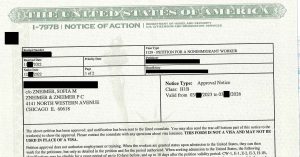The H-1B visa is a type of non-immigrant visa that allows U.S. employers to employ foreign workers in specialty occupations, such as in the fields of technology, engineering, and science. The H-1B status permits a foreign worker to live and work in the United States for up to six years, along with the worker’s spouse and children, unmarried and under 21, who receive H-4 status. Some H-1B workers who are in a process of applying for permanent residence can remain in the U.S. beyond the six-year maximum. Because immigrant visas are subject to per-country quotas, workers born in oversubscribed countries like India or China may take years, sometimes decades to receive permanent residence. Our Chicago immigration lawyers like to point out that under current backlogs, a physician born in India will wait over 11 years in line to receive a green card. In comparison, persons born in countries without backlogs, can immigrate as soon as the paperwork goes through, even if they are not in a professional or a specialty occupation.
If an H-1B worker is laid off, they will generally have to either find a new job and have their H-1B visa transferred to the new employer, or leave the United States. If the H-1B worker is waiting for a green card and is in a backlogged country, the new employer will have to restart the green card from scratch, but the worker’s place in line will not change because the new petition will receive the earliest filing date from any prior petition. If the worker is unable to find a new job and their H-1B visa is not transferred to a new employer, they will be out of status and may be subject to deportation. When a worker falls out of status for more than 180 days, they lose their ability to receive a green card even if they are close to receiving their green card in the line. It’s important for H-1B workers who have been laid off to talk with an immigration attorney to understand their options and ensure that they are in compliance with U.S. immigration laws.
If an H-1B worker is laid off, they may be eligible for a 60-day grace period during which they can remain in the United States and look for a new job. This grace period is known as “60-day portability” and it applies to H-1B workers who have been previously granted H-1B status and who have a new, non-frivolous H-1B petition filed on their behalf within 60 days of their previous H-1B employment ending. This provision allows H-1B workers who have been laid off to remain in the United States and look for a new job without accruing unlawful presence. It’s important for H-1B workers who have been laid off to consult with an immigration attorney to understand their options and ensure that they are in compliance with U.S. immigration laws.
There are no specific deadlines for laid off H-1B workers to find a new job. However, if an H-1B worker is laid off and their visa is not transferred to a new employer within 60 days, they will be out of status and may be subject to deportation if they remain in the United States. It is better for such employee to leave the U.S. while searching for a new job, and return to the U.S. when the new employer’s petition is approved.
If an H-1B worker who leaves the United States has a valid H-1B stamp in their passport and they find a new employer, they may not need to obtain a new H-1B stamp from the consulate to enter the United States. In this situation, when the new employer’s petition is approved, the worker will be able to begin working for the new employer without having to obtain a new H-1B stamp from the consulate.
If the worker is unable to find a new job and their H-1B visa is not transferred to a new employer, they will be out of status and may be subject to deportation. This means that the loss of work for an H-1B worker who is laid off can result in the loss of their ability to live in the United States. It’s important for H-1B workers who have been laid off to consult with an immigration attorney to understand their options and ensure that they are in compliance with U.S. immigration laws. In some hardship cases, H-1B workers may apply for employment authorization for compelling circumstances. Such workers must have an approved Form I–140 petitions but who cannot obtain an immigrant visa due to statutory limits on the number of immigrant visas that may be issued. The regulations allow certain beneficiaries in the United States to apply for separate employment authorization for a limited period if there are compelling circumstances that, in the discretion of DHS, justify the issuance of employment authorization. Consult an immigration lawyer if you believe that you have compelling circumstances to seek work authorization.
 Chicago Immigration Lawyer Blog
Chicago Immigration Lawyer Blog


